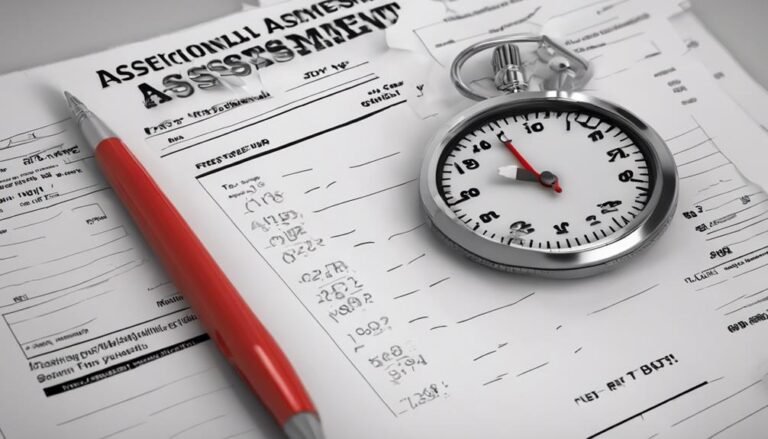Cross-Cultural Issues in Personality Assessment
Imagine traversing through a vast ocean of cultural nuances and norms that shape how individuals perceive and express their personalities. As you plunge into the intricate domain of cross-cultural personality assessment, you'll uncover the complexities that arise when diverse backgrounds intersect with standardized evaluation methods. Consider how cultural biases can influence the very essence of personality traits and the implications this has on assessment accuracy. Stay tuned to explore practical strategies and ethical considerations to navigate this fascinating yet challenging terrain of cross-cultural personality assessment.
Key Takeaways
- Cultural norms influence personality expression.
- Language barriers impact assessment accuracy.
- Bias and stereotypes affect assessment outcomes.
- Adapting tools for diverse populations is crucial.
- Cultural competence ensures fair evaluations.
Cultural Influence on Personality Traits
When evaluating personality traits, it's essential to take into account how culture shapes individuals' behaviors and characteristics. Cultural norms play a significant role in influencing behavior, which in turn impacts the development of personality traits.
Different cultures have varying expectations and accepted behaviors, leading to a wide range of expressions and traits seen across diverse populations.
Understanding the influence of cultural norms on behavior is vital in recognizing the diversity of personality traits. What may be considered assertive in one culture could be seen as overly aggressive in another. These variations highlight the importance of considering cultural backgrounds when evaluating personality traits to avoid misinterpretations.
Language Challenges in Assessment
Managing language challenges in assessment requires sensitivity to diverse linguistic backgrounds and communication styles. Linguistic challenges can arise when individuals speak different languages or dialects, impacting the accuracy and reliability of personality assessments.
Translation issues further complicate the process, as nuances in language may not always directly translate, leading to misunderstandings or misinterpretations of responses.
To navigate these challenges effectively, it's essential to utilize qualified interpreters or translators who understand the subtleties of both languages involved. Additionally, providing assessment materials in multiple languages can help guarantee that individuals can fully express themselves in their preferred language, enhancing the validity of the results.
Bias in Cross-Cultural Testing
When considering bias in cross-cultural testing, it's fundamental to acknowledge the profound impact of cultural influences on assessment outcomes.
Recognizing how validity and reliability can be affected by cultural nuances is vital for fair and accurate evaluations.
Cultural Influence on Bias
Understanding the impact of cultural influence on bias is essential when examining the validity of cross-cultural testing methods. Cultural norms play a significant role in shaping how individuals perceive and interpret assessment tools.
Stereotypes can lead to biased assumptions about certain cultural groups, affecting the accuracy of personality assessments. It's vital to recognize that cultural differences can influence how individuals respond to test items and how their responses are evaluated.
When cultural norms aren't taken into account during testing, there's a risk of misinterpreting results and drawing incorrect conclusions about an individual's personality traits. By acknowledging the influence of cultural background on test performance, assessment professionals can work towards developing more culturally-sensitive testing practices.
This involves being mindful of the diverse ways in which individuals from different cultures may approach personality assessments, allowing for a more accurate and fair evaluation of personality traits across diverse populations.
Validity and Reliability
Recognizing the potential for bias in cross-cultural personality assessments is essential when examining the validity and reliability of test results. Cultural norms play a significant role in shaping individuals' behavior, values, and beliefs, influencing how they respond to assessment tools. When these cultural norms aren't adequately considered during test development and administration, it can lead to inaccurate results, impacting the validity and reliability of the assessment.
Test adaptation is vital in addressing cultural biases in personality assessments. By adapting tests to align with the cultural context of the individuals being assessed, researchers can enhance the validity and reliability of the results. This involves modifying language, examples, and scenarios to be more culturally relevant and sensitive, ensuring that all individuals are assessed fairly and accurately.
Incorporating cultural norms into test development and adaptation processes is essential for reducing bias in cross-cultural personality assessments. By recognizing and addressing these biases, researchers can improve the overall validity and reliability of personality assessments across diverse cultural groups.
Mitigating Cultural Bias
To address cultural bias in cross-cultural testing, it's essential to implement strategies that promote fairness and accuracy in evaluating individuals from diverse cultural backgrounds. Cultural sensitivity plays a pivotal role in ensuring that assessment tools are culturally appropriate and don't favor one group over another. By acknowledging and respecting cultural norms, assessment processes can be adjusted to accommodate the diverse perspectives of individuals.
Cultural awareness is key in mitigating bias in cross-cultural testing. It involves recognizing the impact of cultural factors on behavior and personality expression. Engaging in ongoing training and education on different cultural backgrounds can enhance your ability to conduct assessments in a fair and unbiased manner. It's essential to approach each evaluation with an open mind and a willingness to learn from the diverse experiences of others.
Adapting Assessment Tools for Diversity
When adapting assessment tools for diversity, it's important to consider the unique cultural backgrounds and perspectives of individuals being evaluated. Cultural sensitivity and diversity inclusion are key considerations in this process.
Understanding that individuals may have varying beliefs, values, and communication styles based on their cultural heritage is vital. It's essential to make sure that assessment tools aren't biased towards any particular cultural group, and that they're accessible and relevant to a diverse range of people.
Adapting assessment tools for diversity requires a thoughtful approach that acknowledges the richness of different cultural experiences. This may involve translating materials into multiple languages, offering alternative formats for individuals with different learning styles, or providing additional context to account for cultural nuances.
Ethical Considerations in Assessment
As you consider ethical considerations in personality assessment, remember the importance of privacy and confidentiality to build trust with individuals from diverse backgrounds.
Ensuring cultural competency training for assessors is vital to navigate the complexities of cross-cultural assessments respectfully and effectively.
Privacy and Confidentiality
Respecting the privacy and confidentiality of individuals undergoing personality assessment is paramount in ensuring ethical standards are upheld throughout the process. When conducting assessments, ensuring data protection is essential to safeguard sensitive information shared by the individual.
Building trust is fundamental in fostering an environment where individuals feel comfortable disclosing personal details about themselves. As an assessor, it's critical to communicate clearly about how the data will be used and stored, reassuring the individual that their information will remain confidential.
Maintaining confidentiality not only upholds ethical guidelines but also plays a significant role in establishing a trusting relationship between the assessor and the individual being assessed. It's necessary to prioritize the individual's right to privacy throughout the assessment process, ensuring that their personal information is handled with the utmost care and respect.
Cultural Competency Training
Ensuring cultural competency training in personality assessment is essential for maintaining ethical standards and respecting diverse backgrounds. Cultural awareness and sensitivity training are vital components to ponder when engaging in effective communication and fostering cultural understanding during evaluations.
By undergoing such training, you can develop a deeper understanding of how cultural factors influence an individual's personality, behaviors, and responses to assessment tools.
Cultural competency training enables you to approach personality assessment with a more inclusive and culturally sensitive mindset. It helps you navigate potential biases, misconceptions, and misunderstandings that may arise when evaluating individuals from different cultural backgrounds.
Through this training, you can learn how to adapt evaluation approaches to align with the cultural norms and values of the individuals you're assessing.
Validity and Reliability Across Cultures
Maintaining validity and reliability of personality assessments across different cultures is vital to guarantee fair and accurate results for individuals from diverse backgrounds. Cultural norms play a significant role in shaping how individuals express their personalities and behaviors. Hence, assessment tools must be sensitive to these cultural nuances to make sure that the results truly reflect the individual being assessed.
When dealing with intercultural differences, it's important to take into account how these variations may impact data interpretation. What might be considered a positive trait in one culture could be viewed differently in another. By acknowledging and addressing these differences, assessment professionals can enhance the validity of the results obtained.
Reliability across cultures requires not only standardized procedures but also a deep understanding of the cultural context in which the assessment is being conducted. By aiming for cultural sensitivity and inclusivity in assessment practices, we can ensure that personality assessments are accurate and meaningful for individuals worldwide.
Cultural Competence in Assessment Practices
Understanding and embracing cultural competence in assessment practices is essential for ensuring fair and accurate evaluations of individuals from diverse backgrounds. Cultural sensitivity plays a vital role in the assessment process, as it allows you to recognize and respect the unique cultural norms, values, and beliefs that shape an individual's behavior and personality.
By being culturally sensitive, you can avoid imposing biases or misinterpreting behaviors that may differ from your own cultural perspective.
Moreover, cultural competence enhances assessment accuracy by ensuring that the tools and techniques used are relevant and appropriate for the individual being evaluated. It involves adapting assessment methods to align with the cultural context of the individual, thereby increasing the validity and reliability of the assessment results.
Strategies for Cross-Cultural Assessment
To conduct effective cross-cultural assessments, it's essential to implement tailored strategies that account for the diverse cultural backgrounds of the individuals being evaluated. Cultural sensitivity plays a significant role in ensuring that assessment practices are respectful and inclusive of varying cultural norms and values.
When conducting assessments across different cultures, it's important to be aware of interpretation challenges that may arise due to language barriers, different communication styles, or varying attitudes towards mental health.
Intercultural communication skills are important in addressing these challenges. Assessors must adapt their communication approaches to align with the cultural preferences of the individuals being assessed. This may involve using interpreters, utilizing non-verbal cues effectively, or modifying assessment tools to be more culturally relevant and sensitive.
Assessment modifications can also include adjusting the content of assessments to be culturally appropriate, using examples and references that are familiar to the individual being evaluated.
Conclusion
You've maneuvered the complex terrain of cross-cultural personality assessment with grace and understanding.
Embrace the challenge, for the journey to truly inclusive and unbiased assessments is never-ending.
Remember, a world without cultural sensitivity in assessment is like a desert without water – barren and lacking in nourishment.
Keep pursuing cultural competence, and your assessments will bloom with the vibrant diversity of human experience.







